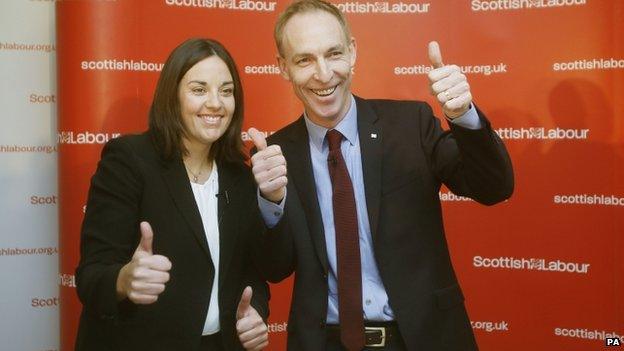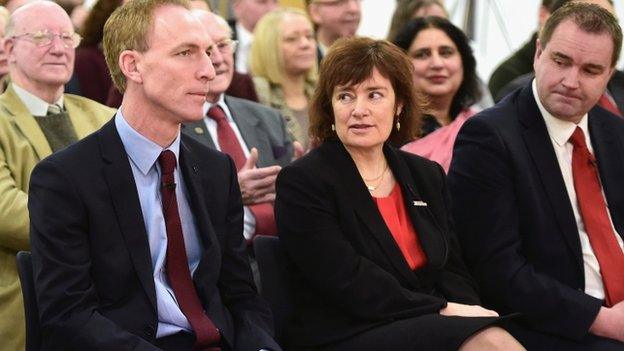MP Jim Murphy named Scottish Labour leader
- Published
- comments
Jim Murphy MP: "This is a fresh start for the Scottish Labour party"
Former UK cabinet minister Jim Murphy has been elected Scottish Labour leader, declaring it his "driving purpose" to end poverty and inequality.
The MP, who stood against MSPs Neil Findlay and Sarah Boyack, also reached out to independence supporters to back his party's vision.
His leadership predecessor Johann Lamont quit the job after nearly three years in the post.
Meanwhile, MSP Kezia Dugdale has been elected the party's new deputy leader.
UK Labour leader Ed Miliband and Scottish First Minister Nicola Sturgeon both congratulated the new leadership team.
Mr Murphy won the contest with 55.77% of the vote under the party's electoral college system, in which Scottish Labour MPs, MEPs and MSPs, party members and unions and affiliated organisations each get a say in the outcome.
Ms Lamont quit as leader in October, accusing her Westminster colleagues of treating Labour in Scotland like a "branch office".
Speaking in Glasgow, the East Renfrewshire MP and former Scottish secretary, said: "This is a fresh start for the Scottish Labour Party. Scotland is changing and so too is Scottish Labour."
Scottish Labour leadership
RESULTS
-
55.77% - Jim Murphy, MP for East Renfrewshire
-
34.99% - Neil Findlay, MSP for Lothians
-
9.24% - Sarah Boyack, MSP for Lothians
Mr Murphy, who has said Scottish Labour will in future make all its own decisions, said he was aiming to defeat the SNP in the 2016 Scottish election and become first minister.
The politician, who will now need to win a Scottish Parliament seat, set out his aim to tackle poverty and said he would use new powers due to come to Holyrood to bring in a new 50p top income tax rate for people earning more than £150,000.
He said: "It is my driving purpose, it is our driving purpose, it's Scottish Labour's driving purpose to end that type of inequality once and for all.
"While I'm proud that so many children from prosperous backgrounds do brilliantly at school, it makes me angry that it's three times harder to get good school results if you're from a poorer family than a prosperous family."
IN FULL- Leadership result

ANALYSIS
By Andrew Black, BBC Scotland political reporter
As expected, Jim Murphy has become Scottish Labour's new leader.
The East Renfrewshire MP was always seen as the frontrunner in this contest, and he's regarded by key figures in the party as the best - and perhaps only - hope of making Scottish Labour winners once again.
And although the former Scottish secretary is traditionally seen as being on the political right of the Labour Party, he is taking the fight to Scottish First Minister Nicola Sturgeon's door, matching her central aim to fight poverty and inequality.
But Mr Murphy says that, unlike the SNP, he'll fund his social justice agenda by making the better off pay more income tax, through more financial powers due to come to Scotland.
At the same time, he also sought to woo supporters of Scottish independence - some of them Labour - into backing his vision.
Taking aim at the likes of the Conservatives, who shared a platform with Labour in the Better Together campaign to keep the Union, he said those who voted "Yes" in September's referendum share far more in common with Labour than some of the political leaders who campaigned for the eventual "No" outcome.
Mr Murphy's first big test is the 2015 UK election and the aim of the SNP - still riding high in Scotland - to significantly increase the number of Westminster seats they hold.
The challenges have been laid out by Scottish Labour's former chief spinner Paul Sinclair, who argues that Ed Miliband is unpopular in Scotland, added to which, voters may feel they can vote SNP in the knowledge they could well get a Labour UK government.
And aside from policies, manifestoes and elections, there are other issues.
Mr Murphy needs to unite the party and assert his position, in the wake of comments by his leadership predecessor Johann Lamont that Scottish Labour was treated like a "branch office" by Westminster colleagues.
And if he wants to realise the dream of becoming Scottish first minister, he'll have to outline his plan for winning a Scottish Parliament seat, ahead of or during the 2016 election.

ANALYSIS
By James Cook, Scotland Correspondent, BBC News
Jim Murphy inherits a party which has suffered a crisis of confidence and a crisis of identity, beset by structural arguments and policy disagreements.
Even its successes have come at a cost.
Mr Murphy was on the front line of a bruising referendum campaign, persuading Scots to reject independence but watching thousands of supporters leave for the Scottish National Party in the process.
Now both parties are preparing for the general election. Labour holds 41 of the 59 Westminster seats in Scotland but polls suggest the SNP could take 20 or more of them in May.
Today Mr Murphy made it clear he would contest the election from the left, describing himself as a socialist who believed in the redistribution of wealth.
But he is also a pragmatist who has turned the safest Conservative seat in Scotland into a Labour stronghold.
So both the SNP and Labour are now promising to grow the economy to tackle inequality.
Which party the voters choose could determine who becomes the next British prime minister.

Mr Murphy added: "It's entirely unacceptable and morally wrong that the poor live nine years shorter lives than the prosperous, and are three times more likely to take their own lives.
"I'm proud of our limitless potential, but we should be unsettled that not all Scots share in it - so Scottish Labour's mission isn't just to unite our country but to build a nation created on social justice.
"If redistribution is our aim, which it is, then we need more wealth, not less, we need more entrepreneurs, not fewer, a growing middle class that more families are able to join."
I am going to be standing shoulder to shoulder with Jim in the campaign to get David Cameron out at the general election
Mr Murphy also made an appeal to those who voted for Scottish independence in September's referendum, adding: "I and the Scottish Labour Party share so much more in common with you and your values of those many hundreds of thousands who voted 'Yes' in the referendum than we do with many of the political leaders who campaigned for 'No' on the 18th of September.
"We share so much commitment to a fairer Scotland. We share a commitment to social justice. We share a sense of values.
"Yes, we disagreed on one vote on one day, but we should not allow that to divide our nation."
Lothian MSP Ms Dudgale, who beat MP Katy Clark to the deputy leader post by 62.89% to 37.11%, now has the task of representing Scottish Labour at Holyrood, ahead of Mr Murphy's attempt to become an MSP.
Ms Dugdale, who replaced MP Anas Sarwar in the role, said her party had a "fine legacy", adding: "We'll look to our past for inspiration but we won't live in it - our focus has to be on the future - a Scottish Labour party that's fighting fit and fighting for our future."
Commenting on the outcome of the election, Mr Miliband said: "Jim showed in the referendum campaign that he is a fighter.
"He showed in the leadership campaign that he is a leader.
"I am going to be standing shoulder to shoulder with Jim in the campaign to get David Cameron out at the general election."

The new Scottish Labour leadership team - Kezia Dugdale and Jim Murphy


The leader contenders - Jim Murphy, Sarah Boyack and Neil Findlay - gathered for the results in Glasgow
Ms Sturgeon also congratulated Mr Murphy and Ms Dugdale.
She said: "While we will undoubtedly cross swords often in the months ahead, my door is always open to those who wish to find common ground and work together in the best interests of people in Scotland - something I hope we will have the opportunity to do."
Ms Lamont's former adviser, Paul Sinclair said Mr Murphy faced a number of challenges, going into the 2015 UK election.
He told the BBC: "Ed Miliband is just as unpopular in Scotland as he is in the south east of England, adding: "I cannot think of a UK Labour leader in my lifetime who's had so little recognition in Scotland and indeed, if you look at the opinion polls, so little trust."
Mr Sinclair said the other issue was whether voters in Scotland felt they could back the SNP and still get a Labour government at Westminster.
He argued: "If the Labour party come second to the SNP and the SNP prop up a Labour government, the crucial last card of the Labour party goes away - that you vote Labour to keep the Tories out, that you can't get a Labour government any other way than by voting Labour.
"If you can vote SNP and get a Labour government then, what's the point of voting Labour in Scotland?"

How might Jim Murphy become Scotland's First Minister?

When Jim Murphy stood for the leadership of Scottish Labour he said his ambition was not only to be boss of his party but to become first minister of Scotland.
Is that possible given the fact that he is not a politician at Holyrood?
The answer is yes, but he will have to take a few necessary steps - some within his control, others not - for it to happen.
Look at this interactive guide to find out what he needs to do.